Mirella Sichirollo Patzer's Blog, page 23
July 7, 2014
Sultana: The Bride Price by Lisa J. Yarde

Book #4 of the Sultana series.
In fourteenth-century Moorish Spain, a marriage of convenience for the sake of peace leads to disaster in the medieval kingdom of Granada. The young queen Jazirah, caught up in a dynastic struggle between warring brothers, fights for her survival. Wed to a husband who looks at her with more suspicion than lust in his eyes, she must escape reminders of a brutal past in a quest to find forgiveness, hope, and love.
Her husband Muhammad faces greater peril than union with a wife he cannot trust. Surrounded by enemies within his family who seek the throne and undermined by ministers who would alter the course of his country’s future, he intends to rule the land of his ancestors alone. How can he endure against his most bitter opponents, not least among them, the woman whom he has chosen for a bride?
My Review
Do you want to discover a fabulous, talented new author? Do you want to sink your teeth into a gripping, poignant, and rich tale of power, lust, greed, and love? If you have not yet read the Sultana series of novels by author, Lisa J. Yarde, then I encourage you to read this series! The books are a comprehensive historical journey deep into the heart of medieval Moorish Spain, but more importantly, the books are gripping, powerful, and fascinating revelations into murder, greed, and family conflicts. Incredibly, it is all based on fact.
Now, with this fourth book in the series, THE BRIDE PRICE, we are introduced to a new generation in this epic family saga. At the center of the story is a burgeoning romance between Muhammad, the current Sultan of Granada, and his wife, Jazirah, a forced marriage to strengthen family ties. Also returning to the story are the previous Sultana’s Butayna and Maryam whose vitriol continues and threatens to tear Muhammad’s family apart. Love and hate, dark secrets and shocking revelations, all combine to make this story as gripping as the previous books.
I have eagerly followed every book in the series. Lisa Yarde is a captivating writer, writing with powerful, lush prose, and recreating the nail-biting, twisted history of a family’s bloodlust and greed for power. Based on years of intense, impeccable historical research, this book, and others in the series, provide readers with a first-hand look at the dangerous life inside the Sultan’s harem in medieval Granada. Her rich writing is sensual, evoking not only sights and smells, but the strong emotions of the characters, real historical personages.
I cannot recommend this book and the others in the Sultana series enough. Although each book stands alone, I recommend reading the books in order to get the full impact of this historic family. Truly rich reads that will hold your interest from start to finish.









Published on July 07, 2014 07:53
July 4, 2014
Hoyden of the Week - Happy 4th of July
Smile for mommy's camera, darling.

Happy 4th of July!
(I'm so glad some things have changed. I can't even imagine putting a gun into a child's hand. Good grief! What were they thinking back then!










Happy 4th of July!
(I'm so glad some things have changed. I can't even imagine putting a gun into a child's hand. Good grief! What were they thinking back then!









Published on July 04, 2014 16:00
June 21, 2014
Alexandra Lisowska - Roxelana
Ascent to power - from humble slave to Sultana
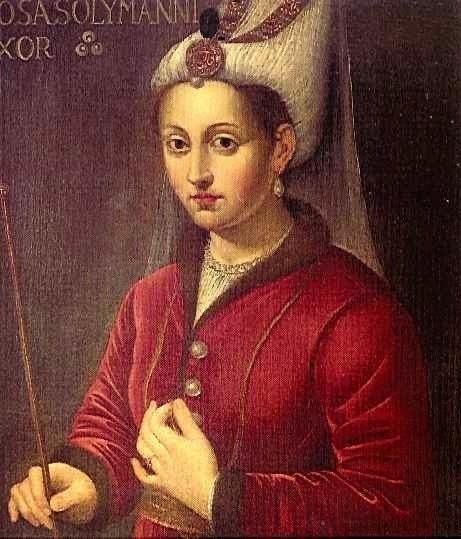
How does a good Ukranian girl, the daughter of an Orthodox priest end up as a slave in Constantinople? Crimean Tartars, of course. Her red hair made her unique, so eager to cash in on their prize, they sold her as a slave. Sharp tongued and quick witted, the unruly Roxelana was bought and sold several times. Finally, she was sold to the harem of Sultan Suleyman.
For two years, Roxelana spent her time learning the Koran and the languages spoken in the Harem, namely Turkish, Arabic, and Persian. And of course, there were the womanly arts to learn too - singing, belly dancing, while she waited to be chosen for the Sultan's bed. But these were the things all the harem women learned. Roxelana wanted more - much, much more. So she watched and secretly watched those in power and the power structure of the Sultan's court. Roxelana befriended the Sultan's mother and made strong alliances with the other women.
Then the day she had dreamed of finally arrived. As the Sultan took a stroll through his harem, he caught sight of her beauty, her red hair, and chose her to warm his bed that night. And Roxelana was more than ready. In addition to her body, she demonstrated her intelligence, regaling the Sultan with wonderful stories and an abundance of humor. Discovering there was more to women than soft curves and bed-sport, the Sultan was enchanted by Roxelana's intelligence. She soon became his favourite, at his side at all celebrations, dinner parties, and death sentences.
Of course, much more was needed to secure her place, so Roxelana set out to provide the Sultan with numerous sons. He was so much in love, he wrote her this love letter:
Throne of my lonely niche, my wealth, my love, my moonlight.My most sincere friend, my confidant, my very existence, my Sultan, my one and only love. The most beautiful among the beautiful... My springtime, my merry faced love, my daytime, my sweetheart, laughing leaf... My plants, my sweet, my rose, the one only who does not distress me in this world... My Constantinople, my Caraman, the earth of my Anatolia My Badakhshan, my Baghdad and Khorasan My woman of the beautiful hair, my love of the slanted brow, my love of eyes full of mischief... I'll sing your praises always
I, lover of the tormented heart, Muhibbi of the eyes full of tears, I am happy.

Statue of Roxelana in Ukraine










How does a good Ukranian girl, the daughter of an Orthodox priest end up as a slave in Constantinople? Crimean Tartars, of course. Her red hair made her unique, so eager to cash in on their prize, they sold her as a slave. Sharp tongued and quick witted, the unruly Roxelana was bought and sold several times. Finally, she was sold to the harem of Sultan Suleyman.
For two years, Roxelana spent her time learning the Koran and the languages spoken in the Harem, namely Turkish, Arabic, and Persian. And of course, there were the womanly arts to learn too - singing, belly dancing, while she waited to be chosen for the Sultan's bed. But these were the things all the harem women learned. Roxelana wanted more - much, much more. So she watched and secretly watched those in power and the power structure of the Sultan's court. Roxelana befriended the Sultan's mother and made strong alliances with the other women.
Then the day she had dreamed of finally arrived. As the Sultan took a stroll through his harem, he caught sight of her beauty, her red hair, and chose her to warm his bed that night. And Roxelana was more than ready. In addition to her body, she demonstrated her intelligence, regaling the Sultan with wonderful stories and an abundance of humor. Discovering there was more to women than soft curves and bed-sport, the Sultan was enchanted by Roxelana's intelligence. She soon became his favourite, at his side at all celebrations, dinner parties, and death sentences.
Of course, much more was needed to secure her place, so Roxelana set out to provide the Sultan with numerous sons. He was so much in love, he wrote her this love letter:
Throne of my lonely niche, my wealth, my love, my moonlight.My most sincere friend, my confidant, my very existence, my Sultan, my one and only love. The most beautiful among the beautiful... My springtime, my merry faced love, my daytime, my sweetheart, laughing leaf... My plants, my sweet, my rose, the one only who does not distress me in this world... My Constantinople, my Caraman, the earth of my Anatolia My Badakhshan, my Baghdad and Khorasan My woman of the beautiful hair, my love of the slanted brow, my love of eyes full of mischief... I'll sing your praises always
I, lover of the tormented heart, Muhibbi of the eyes full of tears, I am happy.

Statue of Roxelana in Ukraine









Published on June 21, 2014 08:22
June 20, 2014
Hoyden of the Week
Published on June 20, 2014 16:10
June 6, 2014
Viola Desmond - A True Heroine
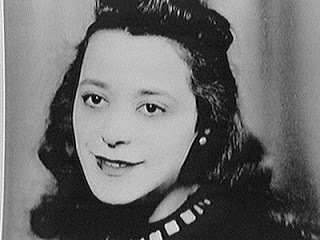
Viola Desmond1914 - 1951Civil Rights Activist
Viola Davis Desmond was born on July 6, 1914 in Halifax, Nova Scotia, Canada. The beautiful and elegant African-Canadian woman owned and operated a successful beauty parlour and beauty college in Halifax. She led a relatively unassuming life until one particular day when she held on tight to her convictions and stood up to the world. What she did became one of the most publicized incidents of racial discrimination in Canadian history.
On a cold and blustery day, November 8, 1946, as Viola Desmond drove from Sydney to Halifax for a meeting, the weather worsened until it became a full-blown Canadian blizzard. As if the weather wasn't enough, her car broke down in town called New Glasgow.
The local mechanic took a look at her car and shook his head. He told her he could not repair it until the next day. A resourceful woman, Rosa booked herself into a local inn and looked around. What better way to wait out a blizzard than to catch a flick at the local movie house! Her decision was to alter the course of her life forever.
Viola made her way to the Roseland Theatre, stepped up to the wicket, and asked to purchase a ticket for house seats. Instead, the teller sold her a ticket for the balcony. Unbeknownst to Viola, the house seats were designated for whites only. The balcony was where blacks were to sit.
Viola made her way into the theatre and settled into a seat on the main floor. Before long, the manager approached and ordered her to move to the balcony.
Indignant, Viola refused. Outraged, the manager called the police who immediately arrested her, dragged her from the theatre, and placed her in a jail cell to spend the night.
Bruised and enraged, with her immaculate elbow-length white gloves on herhands, Viola sat primly upright on the hard bench in her cold jail cell the entire night, a total of 12 grueling hours.
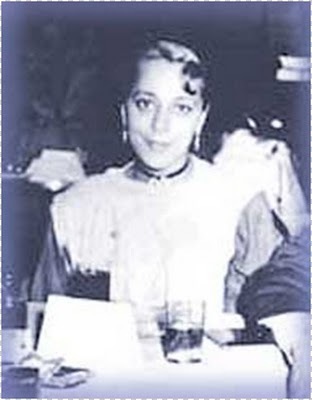
In the morning, she was brought before a magistrate who charged her with Attempt to Defraud the Federal Government based upon her refusal to pay the one cent amusement tax difference between the 3 cents charged to balcony patrons and the 2 cents charged to main floor patrons.
Viola immediately offered to pay the difference. But the lawmakers of the time wished to make an example of her. They convicted her for failing to pay the tax. When the short trial was over, Viola received a fine of $20.00, which she immediately paid. But there was a principle at stake, so she challenged the charge in court.
The crown made strong arguments against her. They insisted this was a case of tax evasion and argued that the retail sales tax was calculated based on the price of the theatre ticket. After all, it was not the theatre's fault they could only sell Viola, a black woman, a less expensive balcony ticket. It was Viola who insisted upon sitting in the more expensive main floor
Throughout her trial, no one admitted that Viola Desmond was Black and that the theatre maintained a racist seating policy. No, best to stickk to the facts - the trial was simply about tax evasion and nothing more.
After a brief trial, Viola was found guilty of the charge and additionally fined court costs plus an additional 30 days in jail. All for the sake of a movie seat and a penny.
Attempts were subsequently made to overturn the conviction, but each one failed and the conviction was upheld. Her lawyer returned Viola's fees. Viola used the money to create a fund to support the Nova Scotia Association for the Advancement of Coloured People (NSAACP).

Having lost and done what she could to stand firm to her own convictions, Viola dismantled her beauty business and moved to Montreal where she enrolled in a business college. Afterwards she moved to New York where she lived until her death in 1951.
The case has become one of the most notorious civil rights cases in Canada and she received great fame. She was dubbed with the monniker "Canada's Rosa Sparks".

On April 14th, 2010, the Lieutenant Governor of Nova Scotia, Mayann Francis, on the advice of the premier of the province, invoked the Royal Prerogative and granted Viola Desmond a posthumous pardon.
Viola Desmond is a true Canadian heroine!










Published on June 06, 2014 17:00
June 2, 2014
Hoyden of the Week
The ad promised these x-ray glasses were sure to work. How come I can't see the sex scene I'm reading!




















Published on June 02, 2014 16:10
May 30, 2014
A woman who spent nine minutes in Heaven - The story of Crystal McVea
The loss of loved ones always brings questions about the afterlife. It is as if my soul needs to know that they are still present, still with us, in God's hands. The story of Crystal McVea soothes and brings a sense of peace for those who so very much want to believe in the afterlife.


















Published on May 30, 2014 09:25
The Loss of Anastasia Romanovna - Ivan's Descent into Madness - Citadels of Fire by L.K. Hill
Peril and Tragedy in the turbulence of 6th century Russia!
By
L.K. Hill
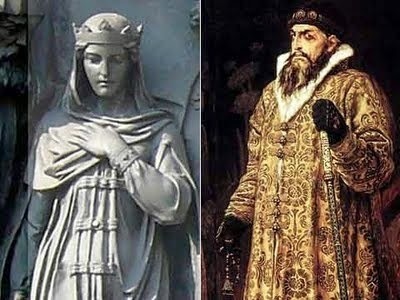
The Loss of Anastasia Romanovna: Ivan’s Descent into Madness
The story of Ivan the Terrible is brutal and tragic. As with most men throughout history, the women in his life influenced him greatly. Ivan was abused and neglected as a child, so he grew up obsessive and brutal. At age seventeen, he had himself declared Tsar by the Eastern Orthodox church, and decided to take a wife.
Ivan invited his nobles to bring their eligible daughters to the palace. He spent weeks getting to know the women, quizzing them, and searching for the perfect one.
And he found her.
Anastasia Romanovna was the daughter of the Romanov clan, who were only minor nobles at the time. (It’s interesting to note that her union with Ivan is what elevated her family to the status of royals, a condition that remained in place until the Boleshevik revolution and the assassination of Tsar Nicholas II and his family.)
Anastasia was everything a woman in her time was expected to be: sweet, graceful, educated, demur, and devoted to her husband. Ivan fell head over heels for her, and she had a profound effect on him. While Ivan was brutal and unbalanced, Anastasia was level-headed and decent. She was a devout, practicing Christian with a calming presence.
If Ivan wanted to execute someone, but Anastasia asked him to show mercy, he would. For her. They were happy together for more than eight years. She bore him several children, and kept him balanced.
In 15?? Anastasia fell ill and passed away a few days later. Ivan’s paranoid mind jumped to assassination—she must have been poisoned!—but he was blind to the truth. In other royal courts, foul play would have been a real possibility but in this case, it was unlikely.
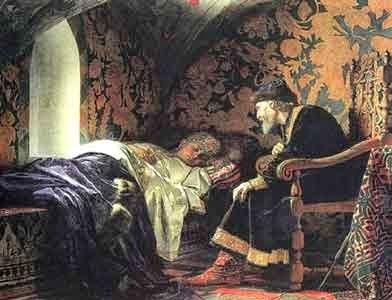
The death of Anastasia
Everyone at court—especially the scheming boyars (courtiers)—knew that Anastasia had Ivan’s ear. If they wanted something, they had to convince her to fight for their cause, and she would bring Ivan around to it. She saved many of their lives by convincing Ivan not to execute them for petty grievances. The boyars remembered how Ivan had been before his marriage, and could see the reign Anastasia kept on her husband’s sanity.
No one in their right mind would have taken Anastasia out.
When she was gone, the only period of quasi-peace Russia knew under Ivan went with her. The tsar not only returned to the brutality of his youth, but went further than before, enveloping himself in a bleaker darkness than ever. He tortured and executed with calloused brutality, and thousands of his own subjects fell by his hand.
Even after Ivan’s death, it would be decades before Russia began to recover. There is definitely Author L.K. Hill brings to life the turbulence of the time in the novel, CITADELS OF FIRE:
Click here to enter the Rafflecopter giveaway
Synopsis
In a world where danger hides in plain sight and no one aspires to more than what they were born to, Inga must find the courage to break the oppressive chains she’s been bound with since birth. Even as a maid in the infamous Kremlin, life in 16th-century Russia is bleak and treacherous. That is, until Taras arrives. Convinced that his mother’s death when he was a boy was no mere accident, he returned from England to discover what really happened. While there, he gains favor from the Tsar later known as Ivan the Terrible, the most brutal and notorious ruler ever to sit upon the throne of Russia. Ivan allows him to take a servant, and to save Inga from a brutal boyar intent on raping her, Taras requests Inga to stay in his chambers. Up against the social confines of the time, the shadowy conspiracies that cloak their history, and the sexual politics of the Russian Imperial court, Inga and Taras must discover their past, plan for their future, and survive the brutality that permeates life within the four walls that tower over them all, or they may end up like so many citizens of ancient Russia: nothing but flesh and bone mortar for the stones of the Kremlin wall.
Amazon
Barnes and Noble
Goodreads
Review
Author L.K. Hill can be contacted and/or followed at:
Facebook: https://www.facebook.com/lkhillbooksTwitter: www.twitter.com/lkhillbooks
Website: www.lkhill.blogspot.com









By
L.K. Hill

The Loss of Anastasia Romanovna: Ivan’s Descent into Madness
The story of Ivan the Terrible is brutal and tragic. As with most men throughout history, the women in his life influenced him greatly. Ivan was abused and neglected as a child, so he grew up obsessive and brutal. At age seventeen, he had himself declared Tsar by the Eastern Orthodox church, and decided to take a wife.
Ivan invited his nobles to bring their eligible daughters to the palace. He spent weeks getting to know the women, quizzing them, and searching for the perfect one.
And he found her.
Anastasia Romanovna was the daughter of the Romanov clan, who were only minor nobles at the time. (It’s interesting to note that her union with Ivan is what elevated her family to the status of royals, a condition that remained in place until the Boleshevik revolution and the assassination of Tsar Nicholas II and his family.)
Anastasia was everything a woman in her time was expected to be: sweet, graceful, educated, demur, and devoted to her husband. Ivan fell head over heels for her, and she had a profound effect on him. While Ivan was brutal and unbalanced, Anastasia was level-headed and decent. She was a devout, practicing Christian with a calming presence.
If Ivan wanted to execute someone, but Anastasia asked him to show mercy, he would. For her. They were happy together for more than eight years. She bore him several children, and kept him balanced.
In 15?? Anastasia fell ill and passed away a few days later. Ivan’s paranoid mind jumped to assassination—she must have been poisoned!—but he was blind to the truth. In other royal courts, foul play would have been a real possibility but in this case, it was unlikely.

The death of Anastasia
Everyone at court—especially the scheming boyars (courtiers)—knew that Anastasia had Ivan’s ear. If they wanted something, they had to convince her to fight for their cause, and she would bring Ivan around to it. She saved many of their lives by convincing Ivan not to execute them for petty grievances. The boyars remembered how Ivan had been before his marriage, and could see the reign Anastasia kept on her husband’s sanity.
No one in their right mind would have taken Anastasia out.
When she was gone, the only period of quasi-peace Russia knew under Ivan went with her. The tsar not only returned to the brutality of his youth, but went further than before, enveloping himself in a bleaker darkness than ever. He tortured and executed with calloused brutality, and thousands of his own subjects fell by his hand.
Even after Ivan’s death, it would be decades before Russia began to recover. There is definitely Author L.K. Hill brings to life the turbulence of the time in the novel, CITADELS OF FIRE:
Click here to enter the Rafflecopter giveaway
Synopsis
In a world where danger hides in plain sight and no one aspires to more than what they were born to, Inga must find the courage to break the oppressive chains she’s been bound with since birth. Even as a maid in the infamous Kremlin, life in 16th-century Russia is bleak and treacherous. That is, until Taras arrives. Convinced that his mother’s death when he was a boy was no mere accident, he returned from England to discover what really happened. While there, he gains favor from the Tsar later known as Ivan the Terrible, the most brutal and notorious ruler ever to sit upon the throne of Russia. Ivan allows him to take a servant, and to save Inga from a brutal boyar intent on raping her, Taras requests Inga to stay in his chambers. Up against the social confines of the time, the shadowy conspiracies that cloak their history, and the sexual politics of the Russian Imperial court, Inga and Taras must discover their past, plan for their future, and survive the brutality that permeates life within the four walls that tower over them all, or they may end up like so many citizens of ancient Russia: nothing but flesh and bone mortar for the stones of the Kremlin wall.
Amazon
Barnes and Noble
Goodreads
Review
Author L.K. Hill can be contacted and/or followed at:
Facebook: https://www.facebook.com/lkhillbooksTwitter: www.twitter.com/lkhillbooks
Website: www.lkhill.blogspot.com









Published on May 30, 2014 00:12
May 29, 2014
History and Women JUNE Book Club Choice - Cicely's King Richard by Sandra Heath Wilson
An illicit love affair! What can be more intriguing than our book club choice for June - a novel about Cicely Plantagenet and her romance with King Edward IV! It's the first in a trilogy about this fascinating historical woman and her life!

It is 1483, and the children of the late Yorkist King Edward IV have been declared illegitimate by their own uncle, the new King Richard III. His second niece, Cicely Plantagenet, hardly knows him, but from the outset is fiercely drawn to this charismatic man, with whom she shares tremendous affinity and rarest of all, his trust. But there will be complete, unconditional passion and the loss of all innocence for Cicely before Richard has to defend his realm, his cause, and his life, against the invading force of the Lancastrian pretender, Henry Tudor, at the Battle of Bosworth Field. This impressive trilogy offers a new and compassionate look at the much maligned, misunderstood Richard, Duke of Gloucester.
Purchase it here on Amazon:










It is 1483, and the children of the late Yorkist King Edward IV have been declared illegitimate by their own uncle, the new King Richard III. His second niece, Cicely Plantagenet, hardly knows him, but from the outset is fiercely drawn to this charismatic man, with whom she shares tremendous affinity and rarest of all, his trust. But there will be complete, unconditional passion and the loss of all innocence for Cicely before Richard has to defend his realm, his cause, and his life, against the invading force of the Lancastrian pretender, Henry Tudor, at the Battle of Bosworth Field. This impressive trilogy offers a new and compassionate look at the much maligned, misunderstood Richard, Duke of Gloucester.
Purchase it here on Amazon:









Published on May 29, 2014 09:45
Mona Lisa of the Galilee
 Mona Lisa of the Galilee by Beth Jacobi “You’re going to have to prove you can wash well enough to look after a husband!” Joanna teased. Pleasure drained from Kezia’s face. The memory of Jared’s icy stare sent shivers down her spine. She looked sideways at her aunt. Would she understand? There wasn’t much time before other women would be sure to join them. Kezia took a deep breath and grasped the moment: “I don’t want to marry!” she announced.
Mona Lisa of the Galilee by Beth Jacobi “You’re going to have to prove you can wash well enough to look after a husband!” Joanna teased. Pleasure drained from Kezia’s face. The memory of Jared’s icy stare sent shivers down her spine. She looked sideways at her aunt. Would she understand? There wasn’t much time before other women would be sure to join them. Kezia took a deep breath and grasped the moment: “I don’t want to marry!” she announced. Murder, betrayal, lust, ambition and ancient faith – the joys of childbirth and the pall of death – are sprinkled with racial tension, political intrigue, family honour, humour and love in Mona Lisa of the Galilee, a historical family saga set in 1st century Palestine. This unique and page-turning novel follows twelve-year-old betrothed Kezia from the close of her childhood as she matures into a woman of passion. She has been engaged to be married since the age of six, but a near-death brush with fever changes her outlook on her match. Culture and faith collide in the quest for love...
A captivating novel, Mona Lisa of the Galilee will be enjoyed by fans of historical fiction. Author Beth has been inspired by a number of authors, including Anita Diamant, Victoria Hislop and Joanna Trollope, as well as a visit to Sepphoris in Galilee. This novel takes place in the village of Sepphoris in Galilee, Israel, slightly north and west of Nazareth during the 1st century Palestine, in the time of Jesus.
 The Mosaic of Sepphora, the Mona Lisa of the GalileeMy Review:
The Mosaic of Sepphora, the Mona Lisa of the GalileeMy Review:Mona Lisa of the Galilee is the tale of Kezia, a twelve-year old girl who is betrothed Jared, a complex man with a temper and a penchant for violence. A brush with death forces her to re-evaluate her life and she is tempted to flee her impending marriage with such a cruel man. The setting is rich with well-researched authentic sights and smells of the era. It’s steadily paced plot is sure to hold the reader’s interest to the end.
True historical Biblical figures - Jesus, Simon/Peter, and other apostles - appear as secondary or minor characters. Despite these personages and religious references, the novel does not focus on religion. Rather, faith is a theme in the background and does not overpower the good storyline. With its engaging prose, larger than life heroine, unique setting, and fascinating historical period, I definitely enjoyed this novel from start to finish.









Published on May 29, 2014 09:17








